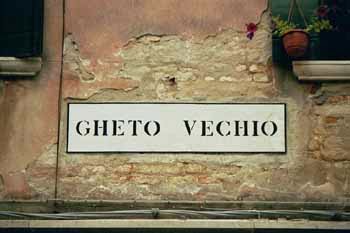The oldest ghetto in existence is in Venice, Italy. In the early 1500’s Venice’s ruling party became concerned about an influx of Jews. Germany and other parts of Europe began expelling Jews at the behest of the Catholic Church. The Spanish Inquisition began in 1478; in 1492 and again in 1501 Jews and Muslims were ordered to convert or leave. Many moved to northern Italy.
became concerned about an influx of Jews. Germany and other parts of Europe began expelling Jews at the behest of the Catholic Church. The Spanish Inquisition began in 1478; in 1492 and again in 1501 Jews and Muslims were ordered to convert or leave. Many moved to northern Italy.
Anti-Semitism existed in many parts of Europe, including Rome to the south, home of the Vatican. The ruling party needed the merchant class so they came up with a ‘workable’ solution. Beginning in March 1516 Jews were forced to move into a special neighborhood that was essentially a small, dirty island near a foundry. Gates were built at the two bridges to the island, then locked at midnight and guarded so the Jews could not leave. During the day Jews were allowed to roam freely throughout the city, not the least so they could spend their money outside their community. The ‘ghetto’ community thrived in many ways. A rich Jewish culture developed with synagogues, a school, theater and literary salons. Christians crossed the bridges to shop. But Jews were given no choice where to live and conditions grew ever more crowded.
Further restrictions were placed on the Jews.They were allowed to be money-lenders, deal in second-hand textiles, work in pawn shops, run Hebrew printing presses and practice medicine. Only doctors were allowed to leave at any time day or night. The Jews were bound by strict tax laws, and were forced to pay for the guards that kept them in at night. The gates would not be torn down until Napoleon Bonaparte arrived in 1797.
Shakespeare’s wrote “The Merchant of Venice,” in 1596. The villian, Shylock, was a Jew who demanded ‘a pound of flesh.’ Historians have argued whether the play was anti-Semitic on Shakespeare’s part, or simply reflective of common attitudes in England. I haven’t seen the play but various Spark notes also describe the character as multi-faceted, perhaps villainous in reaction to how he’s been treated by Christians.
The etymology of the word ‘ghetto’ has many variations, depending on which web site you go to. Various options include:
The word “ghetto” is from the Italian getto meaning “casting” or Venetian geto meaning “foundry.” (www.jewishvirtuallibrary.org)
(The word ‘ghetto’) derives from the German word gitter (iron grill), from the Hebrew word get (divorce) or again from the German gasse (alleyway). However, the most widely accepted theory is that the word comes from the Venetian verb getar, to smelt. (www.jvenice.org)
The English term “ghetto” is an Italian loanword, which actually comes from the Venetian word “ghèto“, slag, and was used in this sense in a reference to a foundry where slag was stored located on the same island as the area of Jewish confinement. An alternative etymology is from Italian borghetto, diminutive of borgo ‘borough’. (Wikipedia)
